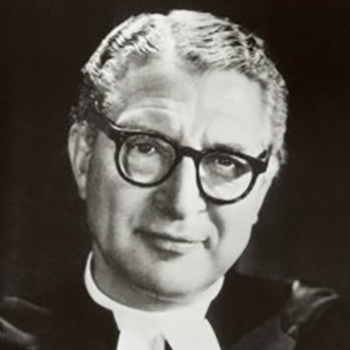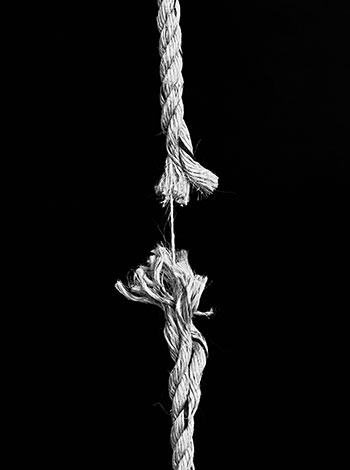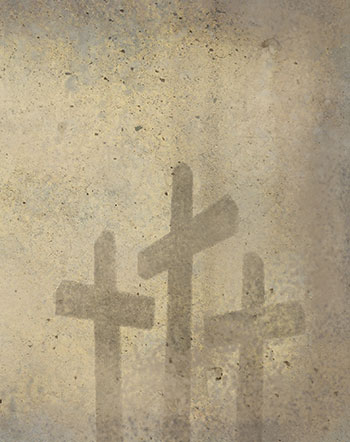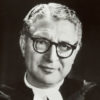Back to series



Sermon: What If Calamity Comes?
Click here to open a Print-Friendly PDF
“Yea though I walk through the valley...."
—Psalm 23:4
NOT everything happens in the world just as God wishes. When people say, "Whatever is, is best," they cannot really mean what they say, or they mean it with certain conditions and reservations which filch the literal meaning from the words. If, in simple truth, "Whatever is, is best," then this is paradise and, as Leibnitz argued, the best of all possible worlds.
 But we find that hard to believe, even when we give the closest heed to the German philosopher's reasoning and allow that "a little bitter is often more pleasing than sugar." Is evil merely a privation, a deficiency, a limitation? the shading of the picture or the discord in the music, just added to heighten and enhance the effect? Can we say with Browning "the evil is null, is naught, is silence implying sound"?
But we find that hard to believe, even when we give the closest heed to the German philosopher's reasoning and allow that "a little bitter is often more pleasing than sugar." Is evil merely a privation, a deficiency, a limitation? the shading of the picture or the discord in the music, just added to heighten and enhance the effect? Can we say with Browning "the evil is null, is naught, is silence implying sound"?
Voltaire makes merry over Leibnitz' reasoning and gives it as his opinion that this is the worst of possible worlds, and while we shrink back from that absurd caricature, we cannot feel that this is "paradise now." Sin seems too positive. Evil leaves its slimy trail over so much that might be fair and beautiful. We pray, "Thy will be done on earth, as it is in heaven," because, as yet, the correspondence of earth and heaven is far from complete.
The writer met a friend one day, a minister, returning from a funeral. Even allowing for the sad errand which had occupied his mind, he seemed peculiarly low-spirited. "I have just buried a child," he said, "and the child's father is under arrest for manslaughter. Last Saturday evening, it seems, he came home drunk, clambered into the bed where his wife and the little one were asleep, and in his fuddled condition pushed the baby out of bed. It fell and, as it fell, the child's head struck the fender. In the gray light of the next morning they found the little body cold and dead upon the floor. The police were called, of course, and the father is in prison awaiting his trial.
"But that wasn't the whole of it," my friend went on. "After the interment, one of the mourners, trying to make a little pious talk in the parson's presence, said, 'Ah well! It can't be helped, I suppose. It was the will of God.' "The will of God?" said my friend bitterly. "That wasn't the will of God. God could never have wished that that dear child be pushed to death by a drunken brute. It was a horrible travesty of all that God would have wished for the little one."
As we parted, I turned the old problem over in my mind again. What happens to the guidance of God when calamity comes? Calamity isn't always the outcome of obvious sin. It overtakes the saints. Untimely death has nipped the life of the noblest souls, and not death merely, but death through agonizing pain. Thomas Arnold, the great headmaster, the friend of God and of boyhood, struck down at forty-seven with angina pectoris. F. W. Robertson, fearless thinker and friend of the working man, passed out at thirty-seven with a terrible abscess in the cerebellum. Henry Drummond, whom Ian Maclaren called "the most perfect Christian I have known or expect to see this side of the grave," died at the age of forty-six after two years on his back in pain. Nor is that the problem at its worst. Hardly a year passes but some great disaster stuns the public mind: the Tay Bridge disaster; the ramming of the Victoria-, the loss of the Titanic; the wreck of the R 101. No easy answer leaps to our lips. The man who finds in all such disasters the judgment of God on a wicked people is both un- convincing and inhuman. Choice souls perish in such an hour, and these calamities visit a thrifty and industrious people as well as a profligate and frivolous one. Disaster, like the rain, falls on the just and the unjust. The horror of it strikes one dumb, and when speech returns, a tempest of questions rises to the lips. Does God guide us? Is there knowledge in the Most High? Does he lead us to the lip of a calamity and leave us to fall in? The problem demands an attempt at an answer because any day might thrust it on our notice again and because it challenges faith. If anguish comes, can doubt be far behind?
It is the opinion of the writer that the perfect will of God is constantly thwarted by human ignorance, stupidity, carelessness, and sin. No other view seems tenable as one looks at this chaotic world. It is a consequence of God's great gift to men of freedom, and without that freedom we should be marionettes and not men. We are born, moreover, into a society and a world where the perfect will of God has been thwarted for ages, and we are bound up in the bundle of life with our fellows. We gain immeasurably by these relationships. We can love one another, serve, help, and influence one another; necessarily we can also harm one another as well. We could not have the blessing without the risk of the bane. God took the risk.
Everything sweet in this life has come to us from others. Our mothers suffered pain to give us birth. Our fathers worked for us. When we were ill, doctors and nurses bent their strength and skill to make us better, and our dear ones turned night into day as they watched at our side. Nor were we allowed to grow up untutored in mind or soul. We were educated. All that clever men and women had ever discovered, or thought, was put before us in ways we could take in, and the best the world has ever learned in things spiritual was made attractive too.
 We learned the name of Jesus. The imperishable stories of the Bible were told us, and all along the path of life precious things, the most precious, have come to us from other people. Friendship, counsel, encouragement, love streaming in on us from others because God has set us here in a great family life, and made us so that our lives intertwine. It should not surprise us, in the light of all we gain, that there is some risk of loss as well.
We learned the name of Jesus. The imperishable stories of the Bible were told us, and all along the path of life precious things, the most precious, have come to us from other people. Friendship, counsel, encouragement, love streaming in on us from others because God has set us here in a great family life, and made us so that our lives intertwine. It should not surprise us, in the light of all we gain, that there is some risk of loss as well.
When God made us so that we could love and help one another, he exposed his family to the possibility that they would hate and harm one another. Necessarily. The one goes with the other. And sin came in, with its long entail of sorrow and suffering, and we can be hurt at any time by the folly, carelessness, or crime of another. But would you rather live in a world in which that couldn't happen? Do you wish God had so made us that we could never influence each other, never be friends, never guide, comfort, or help each other . . . never love? It would be a hateful and unendurable existence, loathsome to us all.
God's will, we believe, for his children, is the perfection of their characters and their ultimate bliss, but the cast of our inherited nature and the conditions of a sin-spoiled world do not allow an easy path to that great end. God therefore permits the woes of life to press upon us; the consequences of our own sin, and sometimes the sin of others; the consequences of our carelessness and ignorance, and the carelessness and ignorance of others. The loss of the Titanic was due to reckless racing through an ice-field, and the death-roll was lengthened by the fact that she only carried boat accommodation for 1,200 people, though the passengers and crew totaled 2,293. It was a compound of pride and criminal folly. But W. T. Stead was among the passengers, going to America in the interests of world peace and to take part in the "Men and Religion Forward Movement." He was drowned.
Yet God meets us in every situation, hears the cry which our bleeding hearts fling to him, and bears with us when, in bitterness, we question his restraint, deny his love, and doubt his existence. Granted a willing and responsive heart in us, he can so turn tragedy to triumph, and loss to gain, that men have even believed that he sent the pain and devised the disaster, so marvelously does he bring good out of evil. Think how closely joy and pain are interwoven in the fabric of our human lives. Our achievements in love measure our capacity for pain. Before I knew my friend or cared for him, his doings were of no account to me. He could pass me in the street with a frozen stare, I did not mind. He did not sympathize with me in my trouble, and I did not miss his sympathy. When success came to me, he sent no congratulations, but it did not make me grave.
We were outside each other's circle and we had no sense of lack. But when I learned to love my friend, I armed him with the power to wound me deeply. I put a weapon in his hand and exposed my heart to its bare point. The more I loved, the more he could wound. If he ignores me now, I am hurt. If he denies his sympathy, I miss it. If he lapses into sin, I share the shame. Love has made me vulnerable, it has exposed me to pain, because pain and love are inextricably interwoven in the only kind of life we know.
If sin had never spoiled this fair earth ... if men had always done the perfect will of God ... if our poor race had responded at every stage to the leading of the loving Father, . . . anything might have happened then. Perhaps there would have been no need of sympathy in such a world. Perhaps character would have grown without discipline.
Perhaps love would never have been linked with pain. Perhaps . . . and perhaps! But in this world, the only world we know, love and pain are interwoven. Mysteriously they belong together. They are united at the very portals of life. There is nothing nobler and sweeter on this planet than mother love, but it is strangely compounded, and half its quality comes from this that a mother goes down to the gates of death for her child. Joy impregnates: pain brings forth: love is born.
None can deny that the trouble-tossed and pain-racked people have often pioneered the way to a better world: John G. Paton, toiling for Christ beside the lonely grave of his wife and child in Tanna; Josephine Butler, bereft of her darling girl ; Bishop Chavasse, the saint with a hump-back. Nor is the truth well expressed if we say that they served well in spite of their woe. They served well because of it.
They carried it to God, and God turned it into triumph. Many a life has been saved by the loss of the Titanic. The track of west-bound steamers across the Atlantic was shifted further south, away from the dangerous ice-fields. The obsolete Board of Trade requirements, with regard to emergency boat accommodation, were stringently revised. Several improvements in life-saving appliances were immediately made, and wireless, which was still in the immaturity of its use, received the impetus which only tragedy can impart.
We see the gains in individual lives as well. Commenting on the sorrows that beset Dr. R. W. Dale, Robertson Nicoll says, "In him was fulfilled the great word, that the men of sorrows are the men of influence in every walk of life." Carlyle comments on the sufferings of Dante in these words: "If all had gone well with him, Florence would have had another Lord Mayor and the world would have lost the Divina Commedia." Of our friends, as well as of our Saviour, we might say, "Fruitful let thy sorrows be." And not only of our friends, but of ourselves.
What, then, shall we say of guidance? If character is God's aim and not our swift enjoyment of some low way of life, should it surprise us that he does not intervene when sin or stupidity, folly or ignorance (our own or another's), brings us to the flinty pathway? Shall we question his love because he persists in treating us as persons and not puppets, and will not rob us of our freedom to save us from our woes? From many of these griefs and pains he could and would have saved us if we had been more sensitive to his leading, and responsive to his call; and it is the whole plea of this book that such guidance is possible, if we will but fulfill the conditions.
 But in a world like ours, where we are close knit in a great family circle and our lives are constantly affected by the deeds of others, it is impossible to think that he could save us from them all, and when we look at our own natures in the light of God, we would hardly desire it ourselves. Disappointment, pain, grief, and loss have taught us so much.
But in a world like ours, where we are close knit in a great family circle and our lives are constantly affected by the deeds of others, it is impossible to think that he could save us from them all, and when we look at our own natures in the light of God, we would hardly desire it ourselves. Disappointment, pain, grief, and loss have taught us so much.
Never have we walked the flinty way but we found him on it when we called. Some of the sweetest souls we have known have walked it longer, and in far, far rougher places, but they say: "He never ceased to guide; he knew the way, knew it at its worst. A hand like this hand reached me in the darkness and led me on. Like this hand? Like....and un-like! It was rough with work at a carpenter's bench and pierced with an ancient wound."
Some are on the path with bitter hearts and lagging feet, and their lives, poor souls, are sour and unlovely. They have not found the Guide or, rather, let the Guide find them. The rebellion in their heart prevents it and the cloud never seems to lift from their toilsome way. Because they do not follow the Guide, they never reach the plains of light.
They do not believe that it leads there. It does. Always, to those who will follow the Guide. It is really the path of Opportunity. Guidance does not end when calamity begins. In every situation he meets us and out of every situation he can lead us to a greener pasture and a sphere of wider use. We can trust Him in whom we have believed.
But when calamity has us in its grip, even this strong thought is not enough of itself. We look the ugly intruder in the face, feel its power to steal the joy from half our life, and cast our querulous inquiries at God, demanding to know why it had to be. In that hour the safeguarding of our freedom doesn't seem enough. In our bewilderment we feel that a loving God would find effective discipline some easier way.
We look at him through mists of tears and wonder if, in his greatness, he really feels our woe. Then it is that our Lord comes and shows us his feet, his hands, his side, and if there were a tongue in every wound of Jesus, we know what it would say: "/ have suffered!" Then it is that we feel with 'Emerson how nigh is grandeur to our dust, how near is God to man. He has suffered. He does not simply reign in some far-off splendor, untroubled by our woe.
"Jesus knows all about our struggles. He will guide till the day is done."
The whole story of the Passion is rich in its power to bless. We go with Him into Gethsemane and feel, even when our own sorrow is most vivid to our thought, that we have not drunk the cup of bitterness so deep as this. In all the dark mystery of it, the shadows seem never so dark as they do in Gethsemane. The word "agony" is used of our Lord only in the Garden.
He was master of himself from the kiss of Judas till he cried with a loud voice and gave up his spirit. But in the garden....agony...the bloody sweat...the pleading prayer. "If it be possible, let this cup pass from me." So he prays, "first on his feet: and then on his knees: and then on his face." He knows it all: deeper, further than any of us. Beside his agony, our own seems to shrink. "And every cross grows light beneath the shadow, Lord, of thine."
Then the voices through the trees and the gleaming lanterns. Judas and his leprous kiss. Poor Peter dragging the sword from beneath his garment and taking a blow at the nearest. He meant it for his head but it only got his ear. The shouts, the trampled undergrowth, the scared disciples, and the inquisitive mob.
 But Jesus is master of the situation again. His will is perfectly attuned with the Father's. He is going right on by way of the cross. Turning on Peter, he ordered the sword back into its sheath and broke their last hopes of spectacular conquest. He would not appeal to force. "Thinkest thou that I cannot beseech my Father, and he shall even now send me more than twelve egions of angels?" But he would not call them.
But Jesus is master of the situation again. His will is perfectly attuned with the Father's. He is going right on by way of the cross. Turning on Peter, he ordered the sword back into its sheath and broke their last hopes of spectacular conquest. He would not appeal to force. "Thinkest thou that I cannot beseech my Father, and he shall even now send me more than twelve egions of angels?" But he would not call them.
He was taking the long way, but the only possible way, the way of love, and no pain would turn him back. Never had his Father broken the rule of the ages and bludgeoned his way into the unwilling hearts of men. Jesus would not ask him to do it now. There was no discord in these wills so perfectly attuned. He would conquer sin with love. He would make the cross a throne.
He would use the shame and pain and humiliation of it to expose the very heart of God, and sin would not triumph : it would be but a dark background revealing, by contrast, the wonder of that love. So he takes the cross, not of compulsion, not by mere submission or resignation, but willingly.
And when we see him there, we have our greatest aid to understanding how the calamities of life can be wrested to our soul's use, and the use of others. He takes it willingly. His arms are not merely stretched upon it: they are wound around it. He holds it to him. He does not merely suffer it, he employs it. And so the symbol of shame becomes the focus point of glory.
In that same willing spirit he desires that we meet, and use, the calamities of life that overtake us. An evil that can be put right must be resisted. The call of a situation that can be corrected is not easy acquiescence but spirited opposition. But those are not the problems we are considering now. There is a finality about bereavement, an amputated limb, an incurable disease, a lost fortune. The real crosses of life have to be borne. Can you bear the cross willingly? That will change it from a weight into wings: it cannot crush you: you rise by it.
"So by my woes to be Nearer, my God, to thee, Nearer to thee!"
Through the shadows he guides still and converts the loss into gain, working out of our folly and mistakes something which will be worthy of the price pain has paid. Thomas Erskine of Linlathen says:
Many things appear, and are irretrievable to us, but there is nothing irretrievable with God. This is a great gospel to my heart. He, who knows how to take occasion from the fall to bring in the redemption, may be safely trusted with each event, and with every action, good and bad. I believe that love reigns and that love will prevail. I believe that he says to me every morning, "Begin again thy journey and thy life; thy sins, which are many, are not only forgiven, but they shall be made, by the wisdom of God, the basis on which he will build blessings."
So we believe. They shall be made, by the wisdom of God, the basis on which he will build blessings. Our sins and our mistakes! Even the saddest of our mistakes: the ones we made when we listened for his guiding voice but did not quite succeed in disentangling it from the voice of self-love. He will build a blessing on it, and in the light of heaven the mysteries will be solved, the gains of our losses made clear, and fullest scope be found for the disciplined abilities we have developed on earth. "Then shall I see and hear and know All I desired and wished below, And every power find sweet employ In that eternal world of joy."
Source: News For Christians.

W.E. Sangster
ReverendW.E. Sangster, Reverend, William E. Sangster (1900 – 1960), was a British Methodist preacher who was known for calling the Methodist denomination to stick to its Biblical roots during the 20th century rather than cave to religious compromise. He eventually became the pastor of London's Westminster Central Hall in 1939. His sermons were regularly stopped by bombings in London and sometimes he preached through them. In 1949, Sangster was elected leader of the Methodist Conference of Great Britain where he emphasized evangelism and spiritual growth. He was an early supporter of the evangelist Billy Graham when many other clergymen in Great Britain were critical of Graham.

 COPYRIGHT: This publication is published by C.S. Lewis Institute; 8001 Braddock Road, Suite 301; Springfield, VA 22151. Portions of the publication may be reproduced for noncommercial, local church or ministry use without prior permission. Electronic copies of the PDF files may be duplicated and transmitted via e-mail for personal and church use. Articles may not be modified without prior written permission of the Institute. For questions, contact the Institute: 703.914.5602 or email us.
COPYRIGHT: This publication is published by C.S. Lewis Institute; 8001 Braddock Road, Suite 301; Springfield, VA 22151. Portions of the publication may be reproduced for noncommercial, local church or ministry use without prior permission. Electronic copies of the PDF files may be duplicated and transmitted via e-mail for personal and church use. Articles may not be modified without prior written permission of the Institute. For questions, contact the Institute: 703.914.5602 or email us.
-
Recent Podcasts
Ralph Waldo Emerson’s Philosophy and Influence
by David George Moore on July 26, 2024Ralph Waldo Emerson was a gifted nineteenth century...Read More
-
The Side B Stories – Nate Sala’s Story
by Jana Harmon, Nate Sala on July 19, 2024
-
Terrorism Through the Eyes of Faith
by Dennis Hollinger on July 12, 2024
-
Recent Publications
Hasn’t Science Proven That Belief in God Is an Outdated Superstition?
by Sharon Dirckx on July 1, 2024Many assume that scientific practice and belief in...Read More
-
Has the Bible Been Corrupted as Some Muslims Claim?
by Andy Bannister on June 1, 2024
-
Seeing Jesus Through the Eyes of Women
by Rebecca McLaughlin on May 15, 2024
0
All Booked
0.00
All Booked
0.00
All Booked
22194
C.S. Lewis’s The Abolition of Man Live Online Small Group 8:00 PM ET
https://www.cslewisinstitute.org/?event=c-s-lewiss-the-abolition-of-man-study-course&event_date=2024-10-02®=1
https://www.paypal.com/cgi-bin/webscr
2024-10-02

Next coming event
Days
Hours
Minutes
Seconds
C.S. Lewis’s The Abolition of Man Live Online Small Group 8:00 PM ET
On October 2, 2024 at 8:00 pmSpeakers

W.E. Sangster
Reverend
Team Members

W.E. Sangster
ReverendW.E. Sangster, Reverend, William E. Sangster (1900 – 1960), was a British Methodist preacher who was known for calling the Methodist denomination to stick to its Biblical roots during the 20th century rather than cave to religious compromise. He eventually became the pastor of London's Westminster Central Hall in 1939. His sermons were regularly stopped by bombings in London and sometimes he preached through them. In 1949, Sangster was elected leader of the Methodist Conference of Great Britain where he emphasized evangelism and spiritual growth. He was an early supporter of the evangelist Billy Graham when many other clergymen in Great Britain were critical of Graham.





